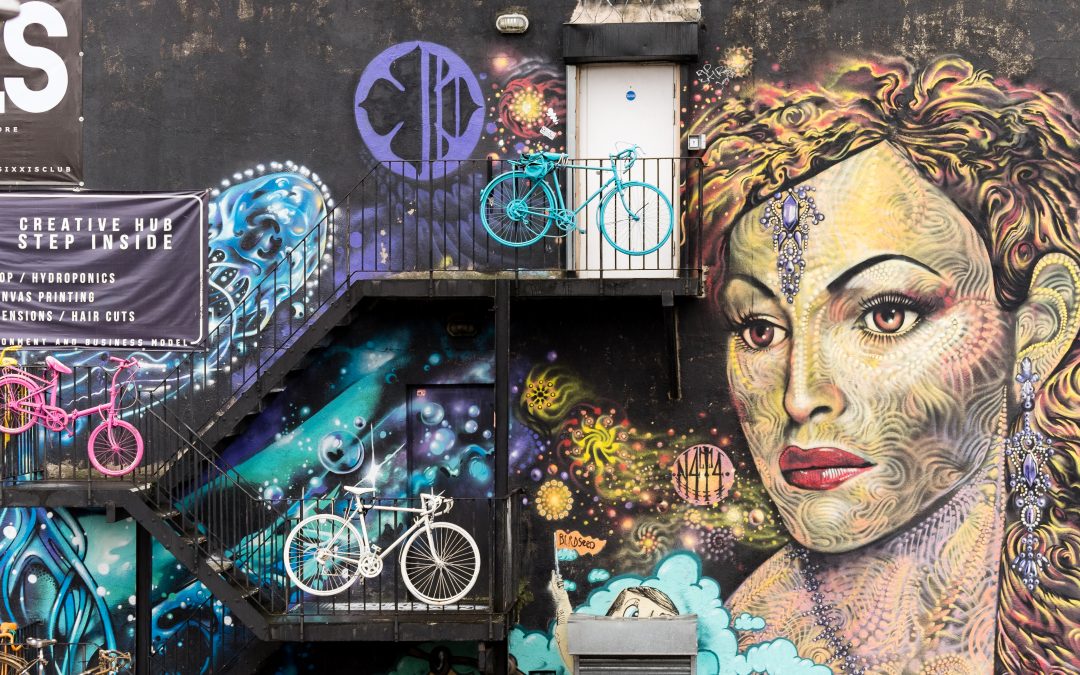In recent years, a growing number of students have been drawn to studying creative degrees but choosing the right location for where to study is just as important.
Here, Dr Leandro Valiati and Dr David O’Brien, the academic leads for our new BA in Creative and Cultural Industries, explain why Manchester is the perfect place for you to begin your academic journey into the creative arts.
- Step into a world-famous music scene
Manchester’s musical roots are well known. The city is the birthplace of The Smiths, Oasis, Joy Division and The Stone Roses and its vibrant music scene continues to thrive. Intimate venues including Deaf Institute and Manchester Academy, as well as the iconic Albert Hall and AO’s Manchester Arena, regularly host international artists and bands, with big names like Florence and the Machine and Anne-Marie performing earlier this year.
The Halle orchestra is also based in Manchester and performs at the Halle St. Peters in Ancoats and The Bridgewater Hall, while Manchester’s night life is also something to celebrate with Canal Street, Deansgate Locks, the Jazz-inspired Blue’s Kitchen all on the doorstep.
- The Mancunian way
Located in the city centre are two art galleries, The Whitworth and Manchester Art Gallery, that host a variety of work from local and international artists as well as different exhibitions throughout the year.
Not only are students able to explore these galleries but there are plenty of opportunities to volunteer and help with upcoming exhibitions, enabling students to gain key experience in art curation.
Separately, it was also recently revealed that the English National Opera (ENO) will be coming to Greater Manchester. The globally renowned company, which is currently based in London’s West End, has announced that it is now working with local leaders on a plan to make the city-region its main home by 2029.
Manchester is also home to two of the most famous footfall teams in the world, Manchester City and Manchester United football, drawing fans from across the globe to visit the city. This sports fervour, combined with widespread urban regeneration, has significantly contributed to the transformative evolution of Manchester’s cityscape.
- Northern Quarter at your fingertips
The city’s famous Northern Quarter is home to an abundance of street art and a variety of independent cafes and restaurants, as well as a wealth of themed bars and comedy clubs. Towering above it all is Afflecks – an independent shopping emporium hosting more than 60 shops and cafes, making for a great place to spend an afternoon.
- A tram journey away from MediaCityUK
Manchester’s Bee Network means that Salford Quays’ MediaCityUK is just a short journey away. Home to the BBC and ITV there are plenty of opportunities to get involved. Whether you want to be a part of the live audiences of some of your favourite shows, have guided tours around the studios or apply for work placements – it is the place to be for all aspiring creatives.
- Abundance of theatres
Also located in Salford Quays is The Lowry, a performing arts theatre and gallery named after local artist LS Lowry. This venue, alongside Manchester’s Royal Exchange and Palace Theatre are never short of performances and plays, with Lin-Manuel Miranda’s multi-award-winning musical Hamilton, currently gracing the Palace stage until February 2024.
Performing arts theatre ContactMCR is another venue located just a stone’s throw away from The University of Manchester and is a must-visit for creative arts students.
- Explore Manchester’s vibrant history
From the worker bee, symbolic of Manchester’s role in the industrial revolution, dotted throughout the city, to museums including the Museum of Science and Industry and the newly renovated Manchester Museum – the city has not forgotten it’s past. The Manchester Museum, situated in the middle of The University of Manchester’s campus showcases both the city’s history as well as international histories of nations such as Egypt and Sudan.
- Culture club
Manchester is a culturally diverse city. Nestled in the heart of the city is HOME Manchester that serves as a vibrant hub to showcase the area’s diverse cultural identities through art, theatre and cinema, all under one roof. Every other year the city also hosts the Manchester International Festival that invites artists, authors, speakers and cultural figures to discuss, showcase and celebrate their work in a series of events.
- Buzzing literary scene
Another annual festival is Manchester Literature Festival, where famous authors from across the UK and beyond, discuss their work and the future of literature. This is a great place for students to meet likeminded individuals and gain insights into the publishing world through attending and volunteering at the festival.
For literature-obsessed students, Manchester also has two libraries: the Central Library located on St Peter’s Square and John Ryland’s Library, a neo-Gothic building located on Deansgate is home to an extensive literary archive including the oldest known piece of the New Testament.
- Cottonopolis
As a prominent hub for cotton and textile production in the UK, Manchester was once nicknamed the “Cottonopolis”, making the northern city the perfect place for learning about the fashion industry.
Headquartered in the city are a diverse array of brands, and Manchester often has a calendar packed with dynamic fashion events and shows held throughout the year – ensuring ample opportunities for students to stay informed about the ever-evolving realm of fashion.
- Opportunities at The University of Manchester
The University of Manchester is launching a new bachelor’s degree called Creative and Cultural Industries, which aims to give students an understanding of matters impacting the creative sector, whilst equipping them for careers in management and leadership across a variety of industries.
For those looking to pursue a career in music, film, fashion, TV, gaming, publishing, and the performing and visual arts, the course will take a deep dive into policies surrounding these sectors, alongside looking at how the industries operate on a national and global scale.
Find more information about the course and how to apply here.

